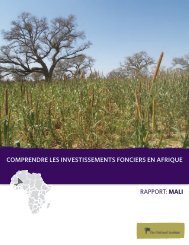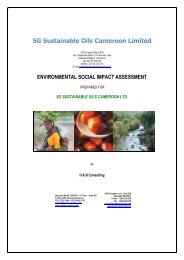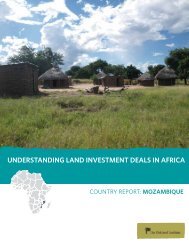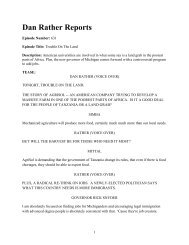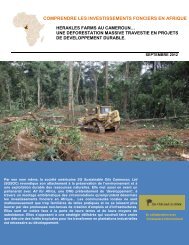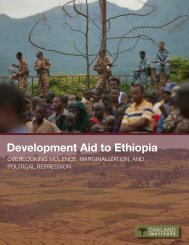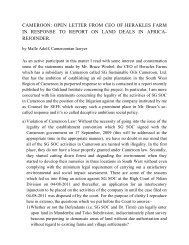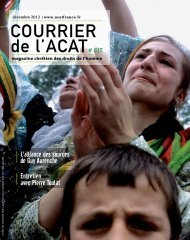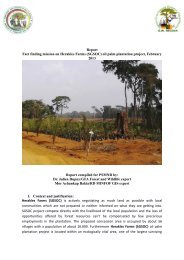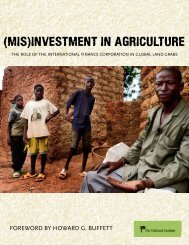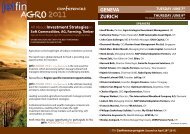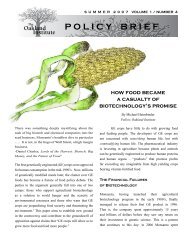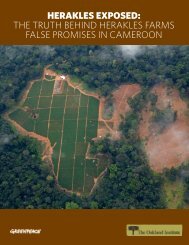Download the field report - Oakland Institute
Download the field report - Oakland Institute
Download the field report - Oakland Institute
- No tags were found...
You also want an ePaper? Increase the reach of your titles
YUMPU automatically turns print PDFs into web optimized ePapers that Google loves.
Suri tribe warrior with body painting.The Lower Omo Valley in Sou<strong>the</strong>rn Ethiopia is internationally renowned for its unique cultural and ecologicallandscape. A UNESCO World Heritage Site, <strong>the</strong> Lower Omo Valley contains two national parks and is hometo approximately 200,000 agro-pastoralists made up of some of Africa’s most unique and traditional ethnicgroups, including <strong>the</strong> Kwegu, Bodi, Suri, Mursi, Nyangatom, Hamer, Karo, and Dassenach, among o<strong>the</strong>rs.Historically, <strong>the</strong> area has been very isolated, and <strong>the</strong> agro-pastoralists have little experience with industrialagriculture. While livelihoods differ along <strong>the</strong> length of <strong>the</strong> Omo Valley and between ethnic groups, <strong>the</strong> majorityare agro-pastoralists who practice flood-retreat agriculture on <strong>the</strong> banks of <strong>the</strong> Omo River and also raisecattle where <strong>the</strong> annual flooding of <strong>the</strong> Omo River replenishes important grazing areas. For many of <strong>the</strong>seethnic groups, cattle are a source of pride, wealth, and food, and are intimately tied to cultural identity. Theannual flooding of <strong>the</strong> Omo River dictates <strong>the</strong> rhythms of life and culture that permeate <strong>the</strong> area. But with <strong>the</strong>announcement of <strong>the</strong> Gibe III dam, <strong>the</strong> livelihoods and culture of <strong>the</strong> indigenous people of <strong>the</strong> South OmoValley face decimation.www.oaklandinstitute.org4
Ethiopian army soldiers monitoring Suri people during a festival in Kibish.Friends of Lake Turkana, a Kenyan NGO working to streng<strong>the</strong>nand advance <strong>the</strong> environment and natural resources agendain <strong>the</strong> Turkana basin, <strong>report</strong>ed in May 2012: 5“In Suri, <strong>the</strong> government has cleared all <strong>the</strong> grass and treesto allow Malaysian investors to establish plantations. Waterhas also been diverted from <strong>the</strong> mainstay Koka River to <strong>the</strong>seplantations leaving <strong>the</strong> largely pastoral Suri without waterfor <strong>the</strong>ir cattle. […] Following this violation of <strong>the</strong>ir rights,<strong>the</strong> Suri took arms and engaged <strong>the</strong> government forces. Thegovernment forces killed 54 unarmed Suri in <strong>the</strong> market placeat Maji in retaliation. It is estimated that between 57 and65 people died in <strong>the</strong> massacre and from injuries sustainedon that day. Five more Suri have been killed since <strong>the</strong>n […] .Suri people are being arrested randomly and sentenced to 18,20, and 25 years in prison for obscure crimes....”Relocation and RepressionBut to truly grasp <strong>the</strong> depth of <strong>the</strong> ongoing repressionassociated with relocation to pave way for <strong>the</strong> largeplantations, one must venture to <strong>the</strong> west bank of <strong>the</strong> OmoRiver, near <strong>the</strong> Sudanese border, to <strong>the</strong> land of <strong>the</strong> Suri tribe.www.oaklandinstitute.org6
There I meet Amod (name changed for security reasons), whohas his left leg in a bamboo split that serves as a cast. Hisfamily and his cows have come to keep him company. He islying on <strong>the</strong> ground, surrounded by fodder for <strong>the</strong> animalsand by stifling smoke coming from <strong>the</strong> fire that his wife isusing to cook.“I was walking peacefully in my <strong>field</strong> when soldiers began shootingat me for no reason...I was shot with a bullet in my knee. I waslucky, that day 11 people were killed and <strong>the</strong> soldiers threw fourbodies off Dima village bridge. They were eaten by hyenas, weonly found <strong>the</strong>ir bones....”Officially, <strong>the</strong> government plan is to move <strong>the</strong> people of thisarea into new villages, where <strong>the</strong>y are promised access toeducation and health facilities. But nothing comes: “Here inKoka, <strong>the</strong> roads that we <strong>the</strong> Suri people have built were destroyedby <strong>the</strong> plantation’s trucks! Nothing is done to help us: <strong>the</strong> school,<strong>the</strong> clinic, <strong>the</strong> water, it’s us who did everything! We are gettingno help at all!” exclaims Barshota who lives in Kibish, where<strong>the</strong> enormous Lim Siow Jin plantation, financed by Malaysianinvestors, sits right in <strong>the</strong> middle of ancestral Suri land.Dassanech elder, Omorate, Ethiopia.Suri man wounded by <strong>the</strong> security forces.www.oaklandinstitute.org7
“They destroyed everything; <strong>the</strong>re is no more grass for our cows,we can no longer cross <strong>the</strong> <strong>field</strong>s, it’s illegal; <strong>the</strong>y are immense,we must walk for kilometers. Our children can no longer goto school, we can’t even see <strong>the</strong> end when we look from afar,”complains a woman who bends under <strong>the</strong> heavy weight of afilled jerry can.A shepherd whose naked body is covered in white designs(a symbol of beauty) adds: “They diverted <strong>the</strong> water to <strong>the</strong>ir<strong>field</strong>s and <strong>the</strong>re is nothing left for our animals to drink, not tomention us! We have no choice but to go in <strong>the</strong> mountains; butit’s dangerous, we might lose some cows.”His helper, dressed in a cover labeled “Made in China” andcasually resting on his shoulder and with many badgesreading “Love,” continues in a melancholy tone: “The cowsgive less milk, sometimes we only drink blood.”In an attempt to silence <strong>the</strong> criticism, <strong>the</strong> government claimsthat <strong>the</strong> plantations (which usually grow maize, sugar, palmoil, or cotton) will create 150,000 jobs. But inside <strong>the</strong> Kokaplantation were only 20 workers, mostly from o<strong>the</strong>r parts of<strong>the</strong> country, not locals. The workers I met from impoverishedtribes say that <strong>the</strong>y are paid only 30 euros per month and <strong>the</strong>ynever stay very long. As pastoralists, all have a single goal: tosave <strong>the</strong>ir wages to buy a new cow.In Koka, a few Suri have given in and begun working at <strong>the</strong>plantation. “We have no choice – <strong>the</strong> government forces us tostay and work for <strong>the</strong> plantation or be exiled. They also bring inpeople from o<strong>the</strong>r regions of Ethiopia to occupy our land,” said aSuri worker I spoke to at <strong>the</strong> Koka plantation.Locals <strong>report</strong> that a government tactic is to pit one tribeagainst ano<strong>the</strong>r in order to better repress <strong>the</strong>m in case of anuprising. “The Dizzi receive taxes from <strong>the</strong> Malaysian plantation;<strong>the</strong>y collaborate with <strong>the</strong> foreigners and encroach on <strong>the</strong> Suriland,” asserts a former truck driver originally from Nazret, acity in central Ethiopia, who came to <strong>the</strong> South in <strong>the</strong> hopeof making money. According to him and Surma witnesses,it is actually <strong>the</strong> Dizzi with <strong>the</strong> Ethiopian army who killed54 people at Maji.On <strong>the</strong> opposite side of <strong>the</strong> Omo River, <strong>the</strong> government hascreated a similar situation between <strong>the</strong> Bodi and <strong>the</strong> Konso.This led to tribal war, giving <strong>the</strong> government an excuse tointervene.To make room for additional plantations in <strong>the</strong> area, <strong>the</strong>government plans to forcibly relocate some 100,000Suri kids in front of <strong>the</strong> Malaysian plantation entrance in Koka.pastoralists in new settlement villages. “Each family has about50 cows, what will we do if <strong>the</strong>y die? They are our only asset,” aBodi cattle producer explained to me.The situation is all <strong>the</strong> more tense since <strong>the</strong> government isexpecting to allocate only half a hectare of land per family, aBodi chief informs me. People will thus lose all <strong>the</strong> grazingland <strong>the</strong>y need for <strong>the</strong>ir cattle. This is an attempt to change<strong>the</strong> Bodi way of life and convert <strong>the</strong>m into plantation workers.“The government promises us paradise, but we know that we aregoing to hell,” insists one of <strong>the</strong> aggrieved Bodis, “Betweentribes we have always found a solution, when a land conflict hasarisen, but with <strong>the</strong> government it’s impossible.”www.oaklandinstitute.org8
Bodi tribe warriors posing on a bulldozer near Hana Mursi.Kibo, a warrior from <strong>the</strong> Mursi tribe who are neighbors of<strong>the</strong> Bodi, testifies to <strong>the</strong> way in which <strong>the</strong> “volunteers,” as<strong>the</strong> resettled population is termed by <strong>the</strong> government, wereforced to evacuate <strong>the</strong> UNESCO classified Mago Park area:“Entire families had to leave <strong>the</strong>ir lands. The elderly couldoften not walk anymore <strong>the</strong>y were suffering so terribly. We arethreatened by famine, we have less milk, less maize....Withoutgood pastures for our cows, we are nothing. The military hunts usso we flee into <strong>the</strong> forest.”Just outside Hana, Ethiopia’s state-owned sugar corporationhas seized 150,000 hectares to set up a sugar plantation. Theplantation is expected to suck up three billion cubic meters ofwater annually from <strong>the</strong> river. 6Pump installed by <strong>the</strong> Italian company Fri El Green Power.South of Hana, close to <strong>the</strong> Kenyan border, I find Omorate,a big, dry village on <strong>the</strong> banks of <strong>the</strong> Omo River where <strong>the</strong>Dassanech live. I meet a chief who has an ivory necklacehanging around his neck. He lives right next to a giant pumpbelonging to <strong>the</strong> Italian company Fri El Green Power’s 60,000hectare palm oil plantation that irrigates <strong>the</strong> surrounding<strong>field</strong>s, and <strong>the</strong> generator’s noise is abrasive and continuous.www.oaklandinstitute.org9
Malaysian plantation in Koka near Kibish.Life On <strong>the</strong> GroundOn <strong>the</strong> road, I catch some bulldozers in <strong>the</strong> act of destruction:<strong>the</strong> trees are uprooted, everything is flattened.At this Malaysian Koka plantation 2 to 3 army soldiers guardevery bulldozer working in <strong>the</strong> <strong>field</strong>s.Ano<strong>the</strong>r consequence of <strong>the</strong> developments afoot in <strong>the</strong> regionthreatens to quickly decimate <strong>the</strong> tribes. Under <strong>the</strong> conditionof anonymity, a nurse working among <strong>the</strong> Mursi explains tome that <strong>the</strong> results of first blood tests he has conducted on<strong>the</strong> tribe are absolutely catastrophic.He has uncovered numerous cases of Hepatitis B, a diseasetransferred through blood and sex. AIDS is prevalent as well.With a growing population of workers and soldiers movinginto <strong>the</strong> tribal areas, prostitution is on <strong>the</strong> rise. Condomusage is nonexistent. Even <strong>the</strong> government recognizes <strong>the</strong>problem in official <strong>report</strong>s.www.oaklandinstitute.org10
Suri gold panner, Tulgit.Tightening <strong>the</strong> ScrewsDespite increased international attention to <strong>the</strong> situation,<strong>the</strong> government continues to increase repressive tactics andabuse in <strong>the</strong> region to benefit <strong>the</strong> plantations and silence anydissent.Following my return, I keep getting worse news from <strong>the</strong> <strong>field</strong>.The Suri no longer have <strong>the</strong> right to search for gold in <strong>the</strong>river. The mining areas will soon be sold to foreign investors.Students who were protesting on Facebook thanks to <strong>the</strong>3G mobile phone network were told to delete <strong>the</strong>ir accountsimmediately by <strong>the</strong>ir university teachers or face <strong>the</strong> same fateas <strong>the</strong>ir comrades currently in Tum prison. The social mediarevolution has been effectively stifled.Some roads in <strong>the</strong> region are closed to fur<strong>the</strong>r isolate <strong>the</strong>tribes from visitors and witnesses. Traveling <strong>the</strong>re is nowdeclared to be “not recommended without exceptionalreasons” by <strong>the</strong> Foreign Minister. The wife of Welekibo, <strong>the</strong>Suri rebel, was arrested and imprisoned in September 2012in order to pressure her husband to turn himself in and facedeath. There has been no fur<strong>the</strong>r news of her.Four Suri chiefs were also thrown in prison in August 2012.Visits are forbidden and those who die locked up are notreturned to <strong>the</strong>ir families for proper burial. Their relatives fear<strong>the</strong> worst.According to a close local contact, 17 more people were killednear <strong>the</strong> Malaysian plantation in Koka, including women andchildren, in October 2012.www.oaklandinstitute.org11
Suri boy leaning against a wall covered with Amharic and English, Tulgit.In December 2012 and January 2013, I kept receiving more<strong>report</strong>s of killings of members of <strong>the</strong> Suri tribe.Before I left <strong>the</strong> Omo Valley, <strong>the</strong> chief of <strong>the</strong> Bodi made mepromise to return to see him. When I asked him where hewould be next year, in his village or in <strong>the</strong> new settlements,he replied, pointing his finger towards <strong>the</strong> ground, “My fa<strong>the</strong>rwas born here. He is buried here. I don’t want to leave my land.If <strong>the</strong>y try and force us, <strong>the</strong>re will be war. So I will be here in myvillage ei<strong>the</strong>r alive on <strong>the</strong> land or dead below it. But I’m notleaving here.”www.oaklandinstitute.org12
ENDNOTES1 <strong>Oakland</strong> <strong>Institute</strong>. Half a Million Lives Threatened by Land Developmentfor Sugar Plantations in Ethiopia’s Lower Omo Valley. Understanding LandInvestment Deals in Africa. September 2011.2 Ibid.3 Dr. Lim Siow Jin, a graduate of <strong>the</strong> Indian <strong>Institute</strong> of Technology, is <strong>the</strong> founderof DXN. The core business activities of DXN include cultivation, manufacturingand marketing of food supplements. Based in Malaysia with worldwideoperation, <strong>the</strong> company is well-known for its Ganoderma (also known asLingzhi, or King of Herbs) business. DXN’s product lines also include foodand beverages, personal care products, skin care and cosmetics, householdproducts, and water treatment systems.4 See More Killings in Lower Omo, Ethiopia. Friends of Lake Turkana. June 4,2012. www.friendsoflaketurkana.org/folt-blogs/item/210-more-killings-in-loweromo-ethiopia(accessed January 8, 2013).5 Friends of Lake Turkana. “Ethiopia Forcefully Evicting Omo Tribes for SugarPlantations.” Press Release. May 16, 2012. www.friendsoflaketurkana.org/foltnews/2011-09-28-10-41-34/archive/view/listid-1-mailing_list/mailid-11-pressrelease-ethiopia-forcefully-evicting-omo-tribes-for-sugar-plantations(accessedDecember 14, 2012).6 See Ethiopia tribesmen fear forced end to “backward” lifestyle, RNW, December21, 2011. www.rnw.nl/africa/article/ethiopia-tribesmen-fear-forced-end-%E2%80%9Cbackward%E2%80%9D-lifestyle (accessed January 10, 2013).www.oaklandinstitute.org13



